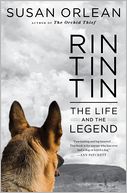|
The Life and The Legend
Susan Orlean
Simon and Schuster
September 27, 2011 / 978-1-4391-9013-5
Non-Fiction / Biography / History / Dog / Arts & Entertainment
Amazon
Reviewed
by Elise Cooper
Susan Orlean’s
latest book, Rin Tin Tin: The Life and the Legend (RTT),
is a story that shows how dogs truly are man’s best friend.
She chronicles the dog’s life from being rescued during World
War I to becoming a silent screen star, and finally enjoying a re-emergence
as a television star in the 1950s.
The book begins with Lee Duncan, a corporal in the US army stationed
in France during World War I, who finds and rescues a German Shepherd
and her puppies. Since Lee was also orphaned, he and one of the
puppies, whom he named Rin Tin Tin, developed a strong bond. Orlean
gives tidbits of trivia about Rin Tin Tin throughout the book, including
how the German Shepherd was named: Rin Tin Tin was a toy doll that
was named after those who survived the bombing of a railway station
in France.
The main character in the book, Rin Tin Tin, is described very eloquently
by Orlean, as “slim-nosed, with unexpectedly dainty feet and
the resigned and solemn air of an existentialist…more arresting
than beautiful, his expression worried and pitying and generous;
instead of a look of doggy excitement it was something more tender,
a little sorrowful, as if he were viewing with charity and resignation
the whole enterprise of living and striving and hoping.”
The supporting cast is those people who made it their mission to
keep the dog’s legacy alive: Lee Duncan; Bert Leonard, the
TV show producer who inherited the RTT rights after Duncan’s
death; and Daphne Hereford, a breeder of related puppies and collector
of RTT memorabilia. Orlean explored the human story of those people
who became devoted and obsessed with RTT and his legacy. She commented
that she wanted to emphasize that “it was a matter of balance,
at what point are decisions surrounding commitment foolish.”
In the book she wrote that “Lee devoted his whole life to
Rinty, at a cost of never seeming to get ahold on anything else
that mattered, like his family and friends…” She also
describes Bert, who turned down a $5 million offer by Disney to
buy the rights, even though he desperately needed the money. Finally,
there was Daphne who incurred tremendous legal bills in the attempt
to control the trademark. It was interesting how she pointed out
that all of these people incurred hardships, because they refused
to let go of this obsession.
A great quote in the book which sums up anyone’s feelings
that has owned a dog, “A dog can make you feel complete without
ever expecting much in return.” Since she has a Welsh Springer
Spaniel, she commented about that quote, “dogs demands are
that you love them. They give a completeness of companionship that
is very unusual. With a dog they are happy if you love them. They
are willing to be your friend with very little demand beyond food
and water.” She definitely conveys this in her book when she
talks about the relationship between Rin Tin Tin and Duncan.
A theme of the book is how RTT affected America’s culture.
She does a good job of this when talking about Anne Frank’s
love for Rin Tin Tin, and how she wanted to see the RTT movie, Lighthouse
by the Sea, but was forbidden to attend because Jews were not allowed
in movie theaters. Orlean commented that this part of the story
was “absolutely staggering to me. At this point Rin Tin Tin
was the symbol of heroic strength. Maybe part of the appeal was
the idea that this was the American dog that would come and save
her. This could be appealing to a thirteen-year-old girl whose circumstances
were so helpless and dire.”
The one stretch she makes is when she says in the book that “Everything
changed for German Shepherds on May 17, 1963,” the day Life
published a photo showing German Shepherds attacking Civil Rights
workers. When asked why she did not consider the decline of the
breed due to inbreeding and physical problems such as hip dysplasia,
she noted, “German Shepherds can be viewed as an extension
of the police that represented order and authority. In the 1960s
people’s attitudes towards authority really changed. People
made the leap that the breed was mean.”
This is an interesting book for anyone who loves dogs or grew up
on the dog shows Lassie and Rin Tin Tin. Susan Orlean has written
a compelling and informative book that explores the valuable relationship
people have with animals, specifically Rin Tin Tin.
|
